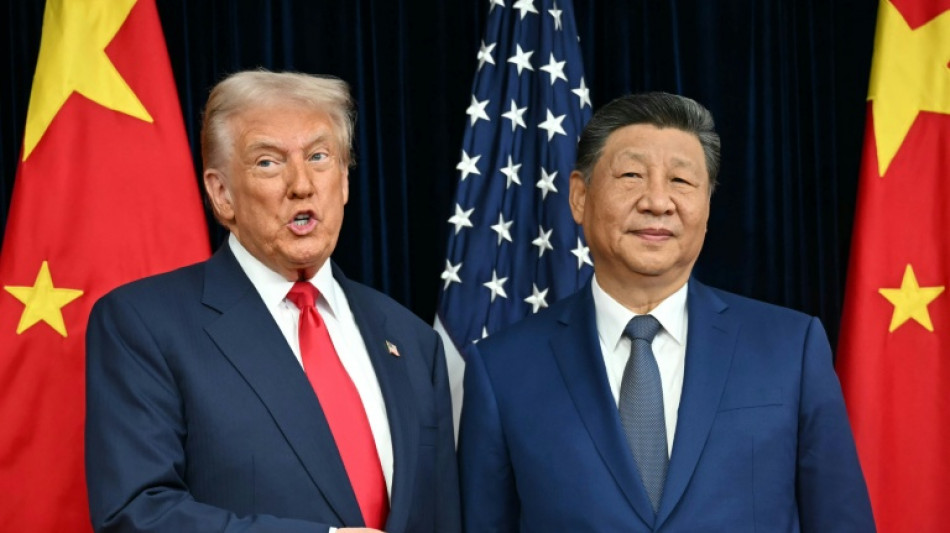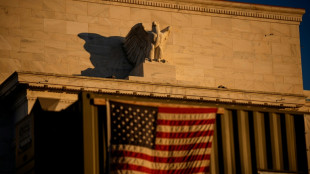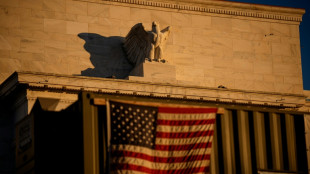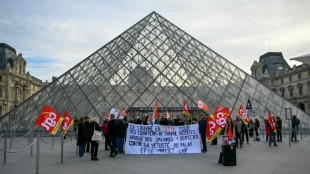
| SCS | 0.12% | 16.14 | $ | |
| CMSC | -0.06% | 23.285 | $ | |
| BCC | -1.53% | 75.357 | $ | |
| NGG | 0.9% | 75.61 | $ | |
| BCE | 1.52% | 23.755 | $ | |
| RBGPF | -4.49% | 77.68 | $ | |
| RIO | -0.38% | 75.37 | $ | |
| AZN | 1.34% | 91.05 | $ | |
| JRI | 0.06% | 13.575 | $ | |
| CMSD | 0.21% | 23.3 | $ | |
| GSK | 0.67% | 49.14 | $ | |
| BTI | 0.44% | 57.35 | $ | |
| RYCEF | 2.01% | 14.9 | $ | |
| VOD | 1.09% | 12.729 | $ | |
| BP | -0.72% | 35.009 | $ | |
| RELX | 1.39% | 40.95 | $ |
Trump, Xi ease fight on tariffs, rare earths

Donald Trump and Xi Jinping agreed on Thursday to ease the trade war between China and the United States that roiled global markets, with Washington cutting some tariffs and Beijing committing to keep supplies of critical rare earths flowing.
Trump hailed his first meeting with Xi in six years as a "great success", while the Chinese leader said the two reached an "important consensus" towards solving an economic dispute that threw international supply chains into chaos.
"I thought it was an amazing meeting," Trump said after the talks in Busan, South Korea, praising Xi as a "tremendous leader of a very powerful country" and saying he would visit China in April.
Trump added that the deal included China immediately buying "tremendous amounts of soybeans and other farm products", a key issue for Trump's support in farm country and a point of leverage for Beijing.
The US leader said the talks yielded an extendable one-year deal on China's supply of crucial rare earths, materials that are essential for sophisticated electronic components across a range of industries.
Beijing's commerce ministry also confirmed it would suspend for one year certain export restrictions, including on rare earth materials, a sector where China is hugely dominant.
"All the rare earths has been settled, and that's for the world," Trump told reporters aboard Air Force One.
Xi said a "consensus" had been reached and urged "follow-up work as soon as possible" to conclude an agreement.
Trump said the Chinese leader had also agreed to "work very hard to stop the flow" of deadly opioid fentanyl, a trade in which Washington has accused Beijing of being complicit.
"I put a 20-percent tariff on China because of the fentanyl coming in... and based on his statements today I am going to reduce that by 10 percent," Trump said.
- 'Partners and friends' -
Neither leader made any public comments immediately after the talks, which lasted around an hour and 40 minutes.
Trump headed straight to Air Force One, waving and pumping his fist as he boarded the plane. The jet took off minutes later.
Xi was seen getting into his limousine outside the closed-door meeting.
Xi acknowledged before the meeting began in earnest that both sides did not always see eye to eye, but should strive to be "partners and friends".
"China and the US can jointly shoulder our responsibility as major countries and work together to accomplish more great and concrete things for the good of our two countries and the whole world," said Xi.
Sitting opposite each other, each leader was flanked by senior officials including Secretary of State Marco Rubio, Treasury chief Scott Bessent and Commerce Secretary Howard Lutnick.
Xi's team, which arrived from Beijing shortly before -- the US side was already in South Korea -- included Foreign Minister Wang Yi, Commerce Minister Wang Wentao and Vice Premier He Lifeng.
- Crowning achievement -
The meeting took place on the sidelines of an Asia-Pacific Economic Cooperation (APEC) summit of 21 countries in Gyeongju including the leaders of Japan, Australia and Canada.
It is the final stop on an Asia tour that saw Trump, 79, showered with praise and gifts, including a replica of an ancient Korean golden crown.
In Japan, new Prime Minister Sanae Takaichi said she would nominate Trump for the Nobel Peace Prize and gave him a putter and a gold-plated golf ball.
However, Trump's hopes of a re-run of his 2019 meeting with North Korean leader Kim Jong Un at the Demilitarized Zone frontier appear to have dashed.
Trump said though that they would meet in the "not too distant future" and that he would like to "straighten out" tensions between North and South Korea.
One surprise in the talks could have been if Xi had brought up Taiwan, with speculation that Beijing might press Trump to water down US backing for the self-ruled island.
But Trump said that Taiwan "never came up. That was not discussed actually."
burs-stu-oho/jm
A.Martin--PS

 London
London

 Manchester
Manchester
 Glasgow
Glasgow
 Dublin
Dublin
 Belfast
Belfast
 Washington
Washington
 Denver
Denver
 Atlanta
Atlanta
 Dallas
Dallas
 Houston Texas
Houston Texas
 New Orleans
New Orleans
 El Paso
El Paso
 Phoenix
Phoenix
 Los Angeles
Los Angeles



